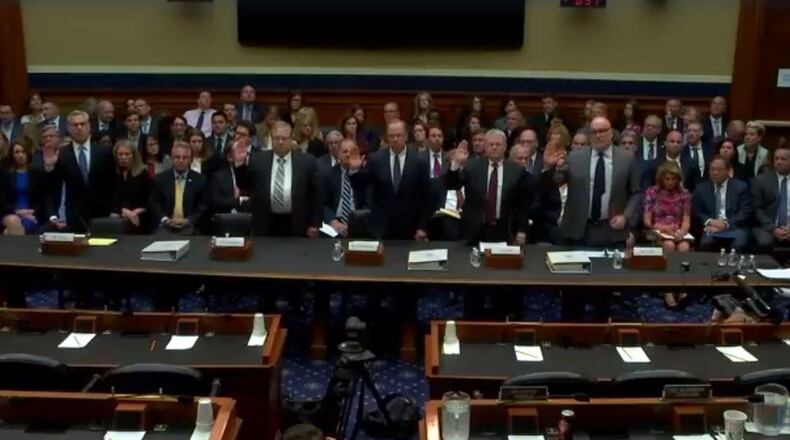The four other executives said no.
MORE ON MIAMI-LUKEN
• Congress continues investigation into Springboro pharmacy distributor
• Why Springboro drug distributor is under fed scrutiny
• Congress investigating local drug distributor
The opioid crisis that led to more than 42,000 U.S. overdose deaths in 2016 has its roots in the misuse of prescription opioid painkillers, prompting scrutiny of the entire pipeline from prescribers, to pharmacies, to distributors to manufacturers.
For a year, the U.S Committee on Energy and Commerce has been investigating whether wholesalers played a role in fueling the opioid crisis. The distributors have pointed out that they fill orders that others have prescribed, they don’t create demand.
“As a distributor, we don’t manufacture prescription drugs. We don’t market them to doctors or patients nor do we market any particular category of drugs such as opioids to pharmacists,” said said John Hammergren, chief executive of McKesson Corp. “Distributors respond to pharmacy orders which are based on doctors’ prescriptions.”
The wholesalers who testified before the committee buy prescriptions from the manufacturers and distribute orders to pharmacies. The committee is probing whether the firms should have raised red flags about suspiciously large orders.
The other testifying executives are AmerisourceBergen, Cardinal Health, and McKesson, known as the “big three” distributors, as well as the former president and CEO of H.D. Smith, a distributor that sold in January to AmerisourceBergen.
Miami-Luken previously provided the committee with documents showing it shipped more than 24 million high power painkillers to four small pharmacies in West Virginia between 2005 and 2015. In one rural town in 2008 alone, that divided out to 5,624 pills for every person in town including children.
RELATED: Area hospital program aimed at getting more patients into drug treatment
In February 2016, Miami-Luken settled with West Virgina’s attorney general for $2.5 million over allegations of flooding the state with painkillers.
Miami-Luken is separately fighting a U.S. Drug Enforcement Administration effort to take away its distribution license and is named in a lawsuit filed in February by Ohio Attorney General Mike DeWine against distributors.
A message was left with DeWine’s office on whether the statement has implications for the state’s lawsuit.
Lori Criss, CEO of the Ohio Council of Behavioral Health, said in reaction to today’s hearing that the crisis was created by “a confluence of complex conditions” and resulted from the actions of many.
“It’s important when those who have not acted responsibly in the past are accountable for their actions and make efforts to behave differently in the future,” Criss said.
Several times during the hearing, Mastandrea admitted to shortcomings in response to questions by the committee members, at times in contrast to the other executives who refuted the questions.
“Do you acknowledge that your company had past failings in maintaining effective controls to prevent the diversion of opioids?” asked U.S. Rep. Gregg Harper, of Mississippi.
“Yes,” said Mastandrea.
RELATED: Local people share their addiction recovery stories
Harper asked if the “extraordinary” volume of pill shipments to small West Virginia towns indicates a breakdown in the system the distributors were supposed to have to monitor for suspcious orders.
“Yes,” Mastandrea said.
In Kermit, W.V., which has a population of just over 400, Miami-Luken shipped more than half of the 4.3 million hydrocodone and oxydone pills that poured into the town in 2008 alone. Miami-Luken’s share divides out to 5,624 pills for every adult and child. U.S. Rep. Diana DeGette, of Colorado, asked if the 15 pages of documentation that Miami-Luken had on the volume of pills it shipped to Kermit seemed like enough due diligence.
“No,” said Mastandrea.
“OK thank you … And you know what? Thank you for your honesty today. I appreciate it,” DeGette said.
Miami-Luken has since stopped doing business with some customers, and since 2014, has reduced the sale of Oxycodone by 61 percent, and the sale of Hydrocodone by 50 percent, said Mastandrea.
Mastandrea said it was his understanding that the former management of his company took what they thought at the time were sufficient steps “believing that State Medical Boards and Pharmacy Boards were in a stronger position to monitor the physicians and pharmacists they licensed.”
He said Miami-Luken now knows that was not enough.
“And as you know from the materials we provided this Committee last year, Miami-Luken has taken aggressive actions going back several years to strengthen its compliance efforts and suspicious order monitoring system,” he said. “And as I sit here now, I can assure you that our company employs a compliance program that is second to none.”
By the numbers: Miami-Luken hydrocodone, oxycodone shipments
6.4 million: Pills sent from 2008 to 2015 to pharmacy in 3,100-person town.
4.4 million: Pills sent from 2008 to 2015 to pharmacy in 1,300-person town.
7 million: Pills sent from 2005 to 2015 to pharmacy in 17,600-person town.
6.3 million: Pills sent from 2005 to 2011 to pharmacy in 406-person town.
Source: Miami-Luken
About the Author
